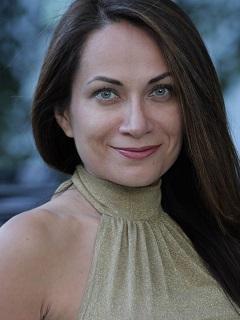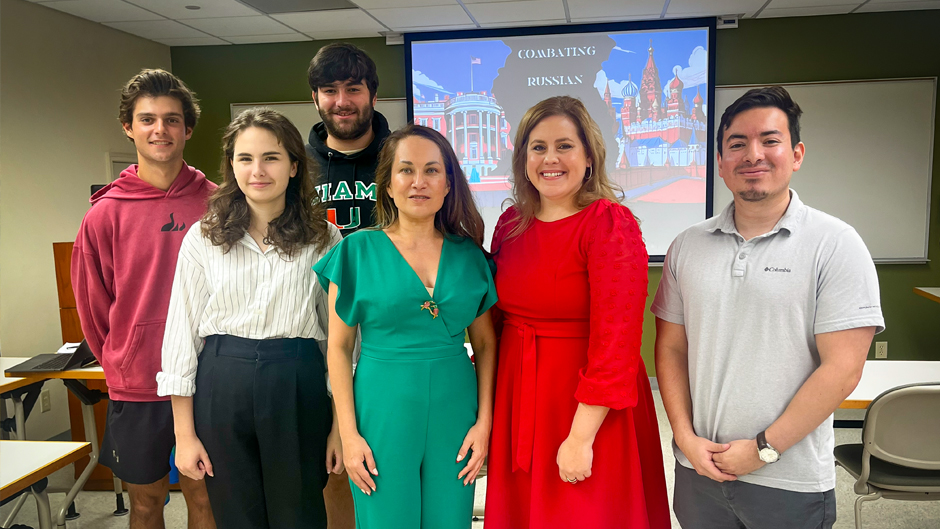Anastasiia Hadomska, originally from Ukraine and now a first-year University of Miami student, knows better than most about the thrust and impact of Russia’s state-funded messaging campaigns that distort and discredit democracy around the world.
As part of a group project in a new class offered this fall, Hadomska and teammates analyzed the threat and urged art and cultural expressions, cultural exchanges, increased oversight by social media companies, and global alliances between like-minded nations to counter the spread of fake news.
“Russia’s claims of being ‘The Great Power’ that manipulate identity and turn it into a weapon have made Ukraine a case study of this misinformation,” said Hadomska. “This is close to my heart.”

Dina Moulioukova, a lecturer in the College of Arts and Sciences Geography and Sustainable Development Department and the International Studies Department and the co-founder of the Global Security Initiative, described the Global Perspectives course as “a crash course in international relations theory.”
“The course is a foundational course for international relations majors and minors and is also offered as a cognate [students take one course in three areas of knowledge]. For many students this is their first course in international relations and the material they learn could seem abstract,” Moulioukova explained. She created a special prompt for the course—that students are working for the United States Department of State and need to generate recommendations to combat state-funded global messaging—to make the learning more applicable.
The learning became even more applicable when two officials with U.S. Southern Command, Ana Christina Gonzalez, deputy director of Intelligence, and analyst Cristian Mazorra, visited the last class to assess the student projects and offer tips.
“These are foundational, critical skills that you are honing as part of these strategies and projects. You’ve all done an amazing job. Hopefully some of you will be joining us in the future,” said Gonzalez, who has worked previously at the U.S. Central Intelligence Agency and the U.S. National Counterterrorism Center with deployments to a range of countries.
For their project, 10 student groups each analyzed the problem of Russian fake news through the conceptual frameworks of international relations—realism, liberalism, constructivism, and postmodernism (including classical Marxism)—to generate their recommendations. Three groups presented on the final day of class, and one was chosen as “the most comprehensive.”
Like Hadomska, Danila Shalaikin, a senior majoring in business analytics and economics, had personal experience to bring to the project. He came to the United States from Russia when he was 15 and spent four years in high school in New York before earning a scholarship to the University.
“I’m 22 and grew up in Russia—[President Vladimir] Putin has been the president there my entire life,” he said. “From the perspective of realism, Russia is always seeking power to become more dominant. And from a liberalism lens, it viewed Ukraine’s move toward democracy as a threat to its influence, which led to the invasion.”
Shalaikin and his team recommended that democratically aligned nations form alliances to strengthen and support each other and that fact-checking programs be created using new AI technologies.
Katherine Ron, a junior originally from Ecuador, took a class with Moulioukova in her first year at the University.
“I really like the interactive style of working in groups and that she challenges us to speak and makes us uncomfortable,” Ron said. “That’s really advanced my critical thinking and progressed my speaking ability because English isn’t my first language.”
Ron recognized that manipulation of information has been part of the jockeying for world power since the beginning of time.
“The Cold War was riddled with misinformation—we learned that Russia even spread a whole campaign of fake news that the United States had invented the HIV virus. So, misinformation is not new But since we have these new technologies, it’s so much easier than before,” she said.
Jackson Morris, a sophomore from Virginia, said his previous studies have focused on Latin America and the Middle East, and he was interested in learning more about Russia.
“I really liked going through the history and learned how misinformation was used by Nazi Germany,” Morris said. “Russia has a big sector that weaponizes information that’s been modernized—it’s a new form of warfare.”

